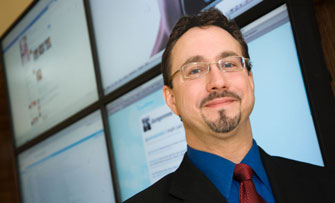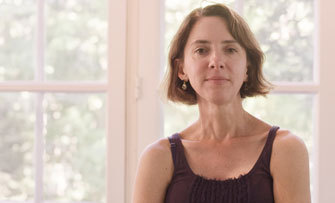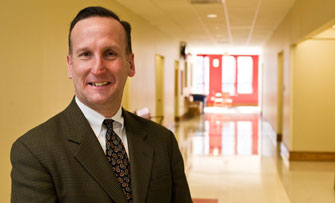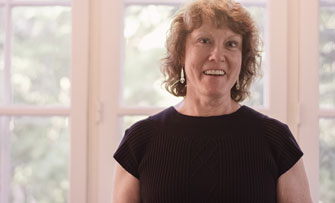Reflections
From Students and Faculty
-
February 7, 2016

Saint Joseph’s new mission statement embodies a number of elements that have contributed to my individual growth and development these past four years. “Preparing students for personal excellence” describes my experience on Hawk Hill the most because of the opportunities I have had, both inside and outside the classroom, to transform theory into tangible results.
One example was a personal project where I developed a comprehensive Excel database to expedite the internship and career search process for students interested in international careers. More importantly, this project enabled me to develop personal relationships with my professors, through which I have gained valuable guidance and perspective.
Having their guidance provided a foundation that encouraged me in all of my leadership roles on campus. As I look toward the future, I am confident the university’s mission statement will guide not only my actions, but those of future Hawks.
Anthony Parascondola ’15
University Student Senate Vice President -
February 7, 2016

Amidst all of the Saint Patrick’s Day celebration, it can be easy to forget that Catholics celebrate another feast day this week: the feast of Saint Joseph. Even though it connects more closely to our institution, I’m used to people overlooking it. Growing up in the Midwest, I was surrounded by people of Irish descent. Each Saint Patrick’s Day, it seemed like everybody in Kansas City claimed heritage in the Emerald Isle. Few of my friends even knew that Saint Joseph’s Day—a feast celebrated in Sicilian and Italian communities—came two days later.
The contemporary celebration of Saint Joseph’s day dates back to the middle ages, when the father of Jesus is said to have interceded during a severe famine in Sicily, bringing rains to water the ailing crops. Not surprisingly, then, many of the traditions of the day revolve around food. The pinnacle of the celebration is the Saint Joseph’s table, an expansive spread of breads, pasta, fish dishes (naturally, as it falls during Lent), and sweets (especially zeppoli and sfinge). It is a visible and edible celebration of God’s blessings.
Sometimes, St. Joseph’s tables are set up privately in homes. But, more often, they are public events. A cross- or altar-shaped table is set up in the church basement or town hall and everyone brings dishes to add to the feast. All are invited to partake—no matter who you are—and frequently part of the food is set aside for those who don’t have enough to eat.
At its core, then, the celebration of Saint Joseph’s day is all about gratitude for the many things God provides. But this gratitude cannot end with ourselves. Rather, it must be turned around into something for others, lest it slide into self-absorption. God has generously blessed us. So we, too, must become blessings for the world.
Jim Caccamo, PhD
Associate Professor and Chair
Theology and Religious Studies -
February 7, 2016

To me, engaged citizenship from an Ignatian context means becoming informed about what is going on in the world around you, taking action to improve the quality of life for people who are on the margins, and reflecting on that action.
Many students have shown me different ways to be engaged citizens. Since I’m in the Sociology Department, most of the examples of engaged citizens I have come from our majors. Cassie Tomkins, who graduated last year, is working with young girls through Jesuit Volunteer Corps in a struggling neighborhood in Chicago. In the midst of this, she is actively making connections between classes she had at SJU and reflecting on her experiences.
Esteban Valencia has tirelessly worked for the last two years to organize a weekly service group of students to go to Graterford State Prison for a book group with men who are incarcerated, connecting his learning from criminal justice classes with experiences outside the classroom.
Michaela McGlynn worked with a social-service agency as a Summer Scholar to conduct a community-engaged research study to explore how well their conflict resolution tactics were working with teens who had been arrested.
Three years ago, I invited union organizers to a class to talk to students about the role of organized labor for service workers. The organizers offered the opportunity for training to the class, and out of 40 students, one, Felicia Carter (a Political Science major), took up the call. She ended up working as an intern and a volunteer with the union, helping to organize low-wage workers in Philadelphia. She has continued her work as an engaged citizen with the advocacy group, NETWORK, after graduating last year.
These students and so many others truly live out the mission of SJU.
Susan Clampet-Lundquist, PhD
Associate Professor of Sociology -
February 7, 2016

Tension exists between our ideals of a market-based economy and our desires for social justice. In general, we agree that folks should be paid in proportion to the economic value they create.
Yet most of us agree something is going terribly wrong. Just last month, Reuters reported that more than half of the world’s wealth will be owned by the richest one percent of the population by 2016.
For the most part, wealth is distributed in the U.S. through private industry. Many students in the Haub School of Business are being prepared to enter this arena – to play an integral role in wealth creation and distribution.
The mission of St. Joseph’s University, which emphasizes our commitment to social justice, comes to life in the HSB curriculum. For example:
- The Pedro Arrupe Center for Business Ethics has trained dozens of SJU faculty on issues related to business ethics and social justice. Each of those faculty members have taken the training back into the classroom, enriching their courses with their enhanced perspective.
- Ethics-intensive courses, such as FIN402 – Portfolio Management, which examines the ethical implications of investing.
- Our major in Leadership, Ethics and Organizational Sustainability (LEO), which trains our students in Ignatian values that help them become ethical business leaders.
- Our service-learning courses, such as MGT120 – Essentials of Management, which exposes students to economically vulnerable citizens, so that our students may experience solidarity and contemplate ways to enhance justice.
When I first came to St. Joe’s, I was surprised by the frequency with which our students saw justice issues during our evaluations of business issues. Now I understand some of the reasons for this. We expose our students to courses, majors and faculty with special emphasis on social justice, thereby enriching our students’ perspectives.
Tim Swift, PhD
Associate Professor, Department of Management
Haub School of Business -
February 7, 2016

I’ve been thinking a lot lately about what it means for an education, a university, to be “rooted in the liberal arts.” I’m a farmer’s daughter, so “rooted in” conjures up images of something green and flourishing growing out of fertile soil. What makes the soil fertile? Or in this case, the education? What makes the liberal arts education especially fertile – capable of producing something of value or worth?
Content is certainly a factor – engaging students with classic texts, great literature, the cultural legacies of diverse societies and peoples. Process is also important. A fertile classroom draws students into the adventure of discovery, the excitement of answering questions, the practical benefits of critical thinking. It helps students link theory to practice.
At Saint Joseph’s University, however, we are rooted not only in the liberal arts, but in the liberal arts shaped by the Ignatian tradition. And this, perhaps most of all, is what makes our soil fertile – we are a community grounded in faith, hope and love.
We teach mathematics not merely for the practical facility of it, but also in such a way that students can see the wondrous God-given beauty built into the structure of the cosmos. We teach Catholicism not merely as part of our intellectual heritage, but as a living practice.
We teach about societies, past and present, so as to challenge students to change the societies in which they live for the better. We infuse our curriculum with ethical considerations, we call students to think about more than their own well-being, we challenge them not only to consider, but to respond to the great questions of life’s purpose, meaning and value.
My hope? That the lives nurtured in this fertile soil flourish for generations.
Shawn Madison Krahmer, PhD
Associate Dean for Humanities
College of Arts and Sciences -
February 7, 2016

Student-centered education at SJU flows out of the model of Ignatian Pedagogy. This Jesuit tradition has produced a process by which teachers accompany learners in the lifelong pursuit of competence, conscience and compassionate commitment.
The pursuit of competence demands vigorous evaluation of student work, holding it to standards of excellence in every discipline. The formation of conscience is accomplished through embedding ethical principles across disciplines and curricula. But, as educators, we are not simply detached, dispassionate critics of our students’ academic work. At our best, whether faculty, staff or administrators, we join our journey to that of our students, as guides and companions in life-long learning, growing with our students as we elicit their voices while training their intellects and helping them cultivate their virtues (as we hopefully hone our own).
This commitment to students is often called, cura personalis, literally, “the care of the person.” It involves risk – the risk of exerting great investment with no sure promise of reward. It involves compassion – not a general feeling of sympathy, but as the word itself connotes, a “suffering with” our students, both in and beyond the academic setting. Above all, student centered education means knowing that, in the words of Michael Joncas, “here in our midst / we touch God’s human face.”
Paul F. Aspan, PhD
Associate Provost
Faculty and Academic Support